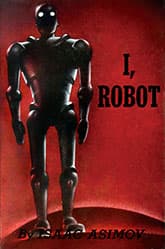I, Robot
Critique • Quotes • At the movies
 First edition
First editionFirst publication
1950
Literature form
Story collection
Genres
Science fiction
Writing language
English
Author's country
United States
Length
Nine stories, approx. 69,000 words

Mathematician Peter Bogert and Dr. Susan Calvin seek the "Little Lost Robot" in a BBC episode.
Doctoring up a robot story
"Little Lost Robot" (1962): Television episode, approx. 51 minutes; director Douglas James; writer Leo Lehman; featuring Maxine Audley, Clifford Evan, Murray Hayne, Gerald Flood, Nicholas Briggs, Roger Snowdon
Adaptations of Isaac Asimov's hundreds of science fiction tales have not exactly flooded the movie or video market—mainly because, I suspect, they are too cerebral for movie-makers and audiences who crave action and romance.
And when I watch the first adaptation I know of an Asimov story—well, I can understand.
As the third episode in a 1962 anthology series, the BBC produced a relatively literal adaptation of "Little Lost Robot", a story in Asimov's I, Robot compendium. The series called Out of This World was cancelled after 13 episodes, and all episodes were erased, except—lucky for us—the robot episode.
So we have intact the earliest video appearance of robot psychologist Dr. Susan Calvin seeking to solve a puzzle among her metallic charges. In this case she's trying to determine which robot, hiding among twenty others (sixty-two in the original story), has had its positronic brain altered to to allow humans to be harmed.
This is a 1962 production though, so its melodramatic and stagy on its single location, with cheap, clunky effects—much like very early Dr. Who episodes.
Full "Little Lost Robot" episode of Out of This World on You Tube.
Dr. Calvin is well played by Maxine Audley. She's the strong and cool woman we know from the stories. There is a half-hearted attempt to push her and fellow investigator Peter Bogert (Murray Hayne) together romantically and lead her to the edge of hysteria at a couple of points. But this is compensated for by the ending. On the floor lie a man dead and a robot destroyed—and guess which one she expresses sympathy for.
The conclusion also includes a hint that robots, having witnessed murder now, could become a bigger problem in the future, which I don't remember being part of Asimov's story.
But these are all elements that make the story more interesting for television audiences. For I have to admit, "Little Lost Robot"—probably like most of the stories in I, Robot—is rather dry and undramatic when transferred from the page to the screen.
Don't get me wrong. With other SF fans, I appreciate the hard-science austerity and playful intellectualism of Asimov's work.
But I understand the temptation to dress up his work for wider pubic consumption. As long as it maintains his spirit and ideals, which we'll see in later Asimov-based productions is not always the case.
— Eric

